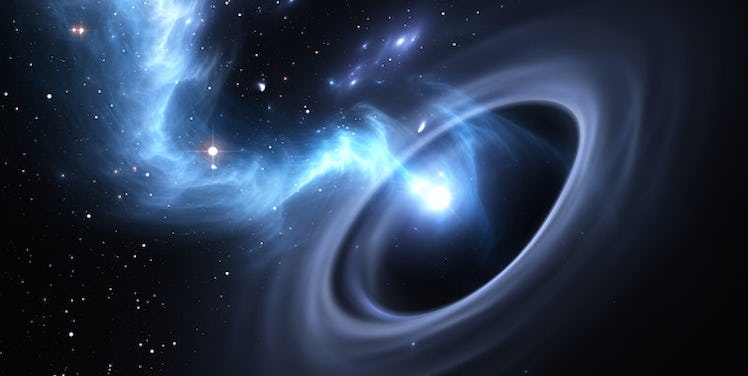
Stephen Hawking's New Theory About Black Holes Will Blow Your Mind
Stephen Hawking unveiled a new theory that could tremendously increase the current understanding of black holes and how they form.
Einstein's theory of relativity states black holes are so dense, no light or matter can escape them.
This would make it impossible to learn anything about their pasts, according to NBC News.
In the 1970s, however, Stephen Hawking proposed an idea: Black holes leak quantum particles and eventually dissipate. This process leaves behind a vacuum, and that vacuum would be identical to all the vacuums left behind by all other black holes.
The new theory developed by Hawking, fellow University of Cambridge physicist Malcolm Perry and Harvard University physicist Andrew Strominger, however, introduced the idea of "soft" photons, or particles of light with no energy.
Storminger told Live Science these particles were never officially detected, but many physicists believe they exist.
He said,
Every collision at the Large Hadron Collider produces an infinite number of soft photons and soft gravitons. We're swimming in them all the time.
If soft photons are incorporated into the previous theory, the physicists found the particles would affect the angular momentums of the black hole vacuums.
That discovery led to the idea these vacuums would have what the physicists refer to as "hair," or collections of particles with no energy on the fringes of the black hole vacuums' event horizons, aka the points where no light or energy escapes the vacuums.
Storminger explained,
Far from being a simple, vanilla object, [a black hole vacuum] is like a large hard drive which can store essentially an infinite amount of information in the form of these zero-energy photons and gravitons.
The paper released by the three scientists on January 5 suggested these hairs contain partial information as to what black holes swallowed.
If that is true, an up-close study of a black hole and the partial information in the hairs could reveal how old the black hole is and how it was formed.
Such observations could even reveal clues about the origins of the entire galaxy the black hole was created in.
Citations: New Stephen Hawking Hypothesis: Black Holes Have 'Hair' (NBC News), Stephen Hawking: Black Holes Have 'Hair' (Live Science), Soft Hair on Black Holes (arXiv)